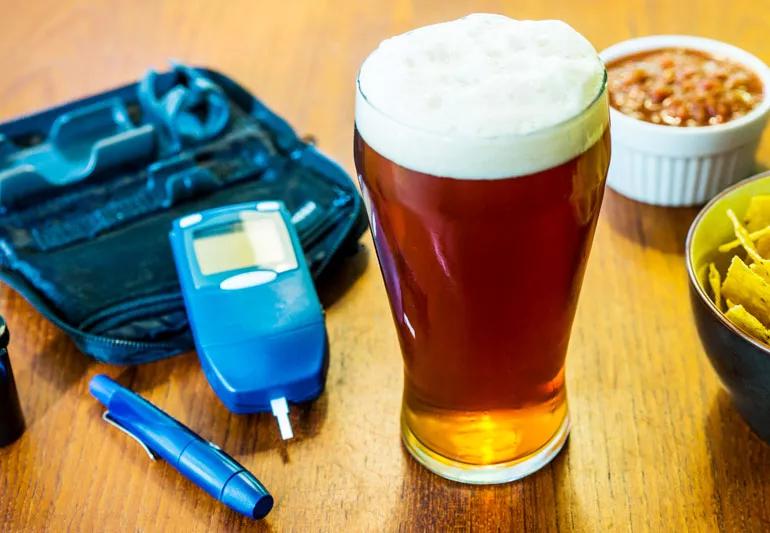Blood glucose monitoring and drinking in moderation can help you avoid hypoglycemia

Alcohol comes with a warning label in the United States and many other countries. It’s a reminder that consumption should come with a degree of caution.
Advertisement
Cleveland Clinic is a non-profit academic medical center. Advertising on our site helps support our mission. We do not endorse non-Cleveland Clinic products or services. Policy
That’s true for all drinkers — but it’s especially true if you have diabetes.
Beer, wine and liquor can interfere with diabetes medications (like insulin), disrupt condition management plans and cause other complications that could take a dangerous turn for your health.
Now, does that mean that someone with diabetes can’t drink alcohol? Not at all. But if you have diabetes and want to enjoy happy hour, it’s best to take an approach that offers you some protection.
Let’s get a plan together with diabetes educator Andrea Harris, RN, CDCES.
Maybe … but maybe not, too. There’s no one answer. That’s why it’s best to talk with your healthcare provider about drinking alcohol when you have diabetes and how (or whether) you can do it safely.
“You need to know if your medications or any diabetes-related conditions you have could be seriously affected by alcohol consumption,” emphasizes Harris.
When it comes to alcohol and diabetes, two related factors come into play — how diabetes medications and alcohol coexist in your system and the effect that drinking has on your liver. Let’s look at both.
Most diabetes medications work to lower your blood sugar (glucose) levels — and they’re particularly good at the job. The problem? Alcohol does the same thing, especially when consumed in larger quantities.
Advertisement
That sort of double impact can cause blood sugar levels to drop to dangerously low levels, a condition known as hypoglycemia.
What’s particularly concerning is that drunkenness and hypoglycemia can look and feel similar, notes Harris. Shared symptoms include:
One last concern, too: The effects of alcohol on your blood sugar can last as long as 24 hours.
Warehousing glycogen, the stored form of glucose, is among the many tasks your liver performs. The glycogen stays there until your liver breaks it down for release to address low blood sugar.
But when you drink alcohol, your liver neglects its blood sugar duties while turning its attention to another one of its jobs — removing toxins from your blood. (And alcohol, as we all know, is a toxin.)
Basically, it’s another path toward hypoglycemia.
To safely consume alcohol while managing diabetes, Harris offers these six tips:
Drinking alcohol isn’t truly “good” for anyone. It can raise your blood pressure and drive up your heart rate. It can fuel anxiety, disrupt sleep and leave your body dehydrated. It can become addictive.
But if you have diabetes, there’s an extra layer of concern that demands attention.
The keys to safely drinking if you have diabetes are to drink in moderation and check your blood sugar regularly, advises Harris. Those two steps will go a long way toward keeping you healthy. Cheers!
Advertisement
Learn more about our editorial process.
Advertisement

Your tolerance decreases with age, thanks to body changes, health conditions and medications you may take

‘Blackout rage gallons’ can lead to dangerous levels of alcohol consumption

An enzyme deficiency or rosacea are potential causes of alcohol flush

ACV may help lower blood sugar and calm acid reflux, but don’t believe all the hype

Yes, grabbing a few beers or a couple of glasses of wine or cocktails with friends can increase your heart rate — dangerously in some cases

Alcohol (in any amount) is a well-known cause of cancer

Forget the myth and answer nature’s call when your bladder feels full

Alcohol provides empty calories, heightens cravings and may slow down your metabolism

Wearing a scarf, adjusting your outdoor activities and following your asthma treatment plan can help limit breathing problems

Your diet in the weeks, days and hours ahead of your race can power you to the finish line

When someone guilt trips you, they’re using emotionally manipulative behavior to try to get you to act a certain way